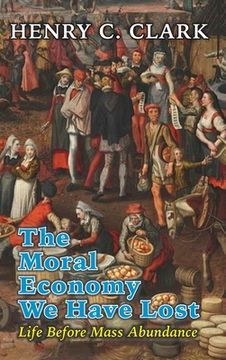Reseña del libro "The Moral Economy We Have Lost: Life Before Mass Abundance"
THIS LANDMARK WORK of cultural synthesis clearly debates fundamental historical issues of morality, government, autonomy, power and self-responsibility, labor, exchange, household economy and consumption. It offers a wide-ranging social-historical assessment of the moralization of economic conduct among ordinary people in pre-modern Europe.Its detailed survey presents a microcosmic view of the human condition. It resets the baseline for critical assessments of modern "capitalism" by offering an alternative to one of the most successful theories of the past half-century: E.P. Thompson's famous paradigm of the "moral economy."This book casts modernity itself in a new light. It records and analyses many of the ordinary activities of ordinary people with a sympathy and a kindly wit which brings them to life after the lapse of centuries, uncolored by the heroics of popular but unhistorical romanticism. Professor Clark's observations are shrewd, real, compassionate, historically-based, and unsentimental. The work highlights fundamental understandings of the most fascinating sources and vignettes. It shows the richness and variety of human character and the implications of the social and moral changes which took place.Taking seriously the quotidian violence and Malthusian constraints facing all our ancestors, and drawing on recent behavioral-science insights into moral agency and economic bias, this work offers an account of pre-modern moral aspiration and economic conduct that is both more modest and more rounded than the original "moral economy" thesis proposed. This rescues ordinary people from an anachronistic romance of revolutionary solidarity.Clark shows that pre-modern food riots were part of a broadly Malthusian honor culture. He defines both the integrative and disruptive features of this "moral economy of honor," and shows that witchcraft was not an aberration but a representative extension of it. He surveys the role of honor in a guild-based system of production, and the economic individualism that nonetheless permeated the life of labor.The end of the long, open revolt against liberalism (1917-91) raised key questions concerning the social use of moral knowledge. Given the stigmas attached to the trader throughout history, by what counter-intuitive process was it that Adam Smith's notion of modernity as one big "commercial society" in which everybody "becomes in some measure a merchant" came to be imaginable? Clark explores the ways in which political economy - often seen as replacing a traditional "moral economy" with a cold and "amoral" market society - actually contributed much, perhaps most, to a genuinely moral modern sensibility. The work frames these investigations globally

